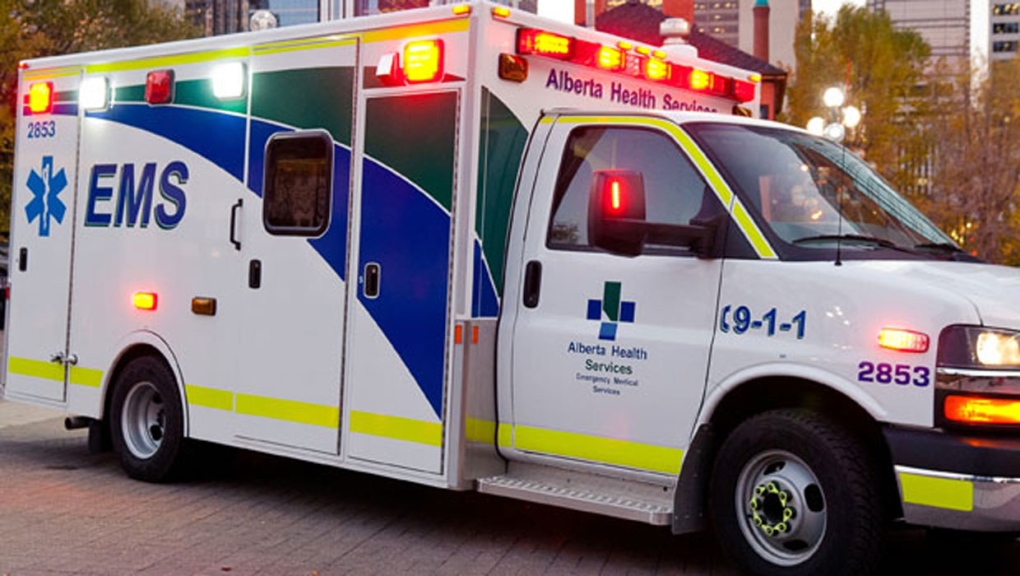EMS response times, staff shortages cause for concern in Alberta health care: Doctor
 An Alberta Health Services' Emergency Medical Services ambulance in Calgary. (file)
An Alberta Health Services' Emergency Medical Services ambulance in Calgary. (file)
Patients in Alberta are at greater risk of negative health outcomes as ambulance services struggle to keep enough crews on the road, according to some health-care professionals.
The problem has created ripples throughout the health-care system, forcing the closure of some health services in small communities.
Dr. Stephanie Cooper is a high-risk obstetrician at Foothills Medical Centre and says ambulance availability has changed the advice she and her colleagues give to pregnant women.
"They have to be counselled, they need to call EMS sooner and in some cases people are avoiding the ambulance and they're just getting a family member to drive them or potentially driving themselves, which is really quite dangerous," she said.
The Health Sciences Association of Alberta says paramedics are badly short-staffed and struggling to keep up with increasing call volumes.
"We're running out of people to do the work that we require on the front-lines of health care, just last week in EMS, 350 infilled shifts in the province, in Calgary alone we dropped 12 units in a single day," says HSAA president Mike Parker.
Those ambulance delays create ripples through the health-care system.
"By the time the EMS provider gets to somebody's home, they've already lost a lot of blood and maybe that person now needs an unnecessary blood transfusion," said Cooper. "But those things aren't tracked."
She says it could be years before the statistical evidence is available to show how delays and staffing shortages are impacting the health of women and newborns, as it's often difficult to prove a direct relationship between any single, delayed treatment and a worse outcome.
But spread across hundreds, or even thousands of patients, trends will eventually appear, even if the specific underlying medical causes are not easily identified.
"In some ways we'll never know, or maybe we'll only know when something terrible happens," said Cooper.
In a statement, AHS says it's working to restore service to smaller communities as soon as possible, but years of low birth numbers have added to the challenge of keeping qualified staff available and properly trained.
CTVNews.ca Top Stories

Canadian team told Trump's tariffs unavoidable right now, but solutions on the table in surprise Mar-a-Lago meeting
During a surprise dinner at Mar-a-Lago, representatives of the federal government were told U.S. tariffs from the incoming Donald Trump administration cannot be avoided in the immediate term, two government sources tell CTV News.
Pedestrian killed by Via Rail train near Kingston, Ont.
Regular rail traffic has resumed with severe delays.
Muskoka reacts to major snowfall, hundreds stuck on Highway 11
From road closures, power outages, weather declarations and nonstop shovelling, Muskoka residents were faced with nearly a metre of persistent snowfall on Saturday.
Saskatoon priest accused of sexual assault says he meant to encourage young girl with hug and kiss
A Saskatoon priest accused of sexual assault says he meant to encourage and reassure a young girl when he hugged and kissed during his testimony at Saskatoon Provincial Court Friday.
Beef prices reach record highs in Canada
The cost of beef continues to rise, reaching record highs on grocery store shelves ahead of the busiest time for many grocers and butchers before the holiday season.
Trump threatens 100% tariff on the BRIC bloc of nations if they act to undermine U.S. dollar
U.S. president-elect Donald Trump on Saturday threatened 100 per cent tariffs against a bloc of nine nations if they act to undermine the U.S. dollar.
Bob Bryar, drummer for rock band My Chemical Romance, dead at 44
Bob Bryar, former drummer for the band My Chemical Romance, has died. He was reportedly 44.
Toronto man accused of posing as surgeon, giving four women injections
A 29-year-old Toronto man has been charged after allegedly posing as a surgeon and providing cosmetic procedures on several women.
'Disappointing': Toronto speed camera cut down less than 24 hours after being reinstalled
A Toronto speed camera notorious for issuing tens of thousands of tickets to drivers has been cut down again less than 24 hours after it was reinstalled.

































